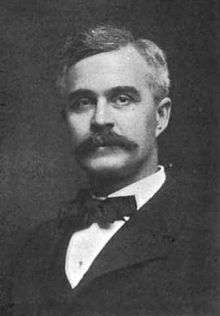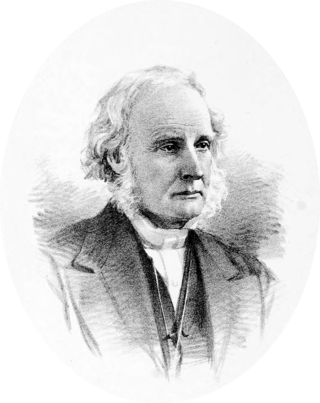
James McCosh was a philosopher of the Scottish School of Common Sense. He was president of Princeton University 1868–88.

Lyman Beecher was a Presbyterian minister, and the father of 13 children, many of whom became writers or ministers, including Harriet Beecher Stowe, Henry Ward Beecher, Charles Beecher, Edward Beecher, Isabella Beecher Hooker, Catharine Beecher, and Thomas K. Beecher.

Charles Augustus Briggs, American Presbyterian scholar and theologian, was born in New York City, the son of Alanson Briggs and Sarah Mead Berrian. He was excommunicated from the Presbyterian Church for heresy due to his liberal theology regarding the Bible.

John Miley was an American Methodist Episcopal minister and theologian, who was one of the major Methodist theological voices of the 19th century.

The fundamentalist–modernist controversy is a major schism that originated in the 1920s and 1930s within the Presbyterian Church in the United States of America. At issue were foundational disputes about the role of Christianity; the authority of the Bible; and the death, resurrection, and atoning sacrifice of Jesus Christ. Two broad factions within Protestantism emerged: fundamentalists, who insisted upon the timeless validity of each doctrine of Christian orthodoxy; and modernists, who advocated a conscious adaptation of the Christian faith in response to the new scientific discoveries and moral pressures of the age. At first, the schism was limited to Reformed churches and centered around the Princeton Theological Seminary, whose fundamentalist faculty members founded Westminster Theological Seminary when Princeton went in a liberal direction. However, it soon spread, affecting nearly every Protestant denomination in the United States. Denominations that were not initially affected, such as the Lutheran churches, eventually were embroiled in the controversy, leading to a schism in the United States.
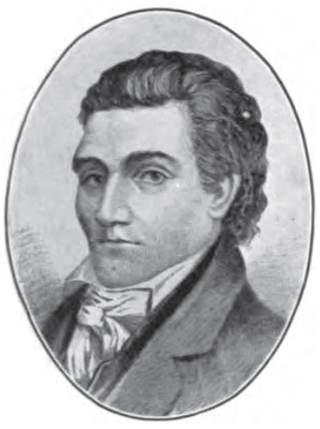
Martin Baum was an American businessman and politician.

William Adams was a noted American clergyman and academic.

Originating in New England, one particular Beecher family in the 19th century was a political family notable for issues of religion, civil rights, and social reform. Notable members of the family include clergy, educators, authors and artists. Many of the family were Yale-educated and advocated for abolitionism, temperance, and women's rights. Some of the family provided material or ideological support to the Union in the American Civil War. The family is of English descent.
Melancthon Woolsey Stryker, D.D., Litt. D., LL.D.,, an American clergyman, was Pastor of the Fourth Presbyterian Church in Chicago and President of Hamilton College in upstate New York from 1892-1917. He distanced Hamilton from the Presbyterian Church, moving it towards becoming a more secular institution.
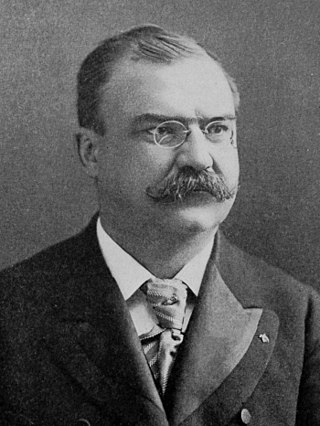
Carl Louis Nippert was a German-American engineer and politician, who served as the 26th lieutenant governor of Ohio in 1902.
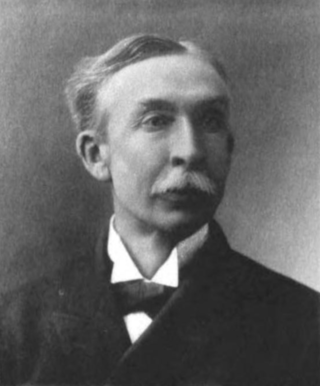
Charles Fletcher Dole (1845–1927) was a Unitarian minister, speaker, and writer in the Jamaica Plain section of Boston, Massachusetts, and Chairman of the Association to Abolish War. He authored a substantial number of books on politics, history, and theology.

Auburn Theological Seminary, located in New York City, teaches students about progressive social issues by offering workshops, providing consulting, and conducting research on faith leadership development.

Rudolph Tietig (1877-1958) was an architect in Cincinnati, Ohio, United States and a partner in the Tietig & Lee architectural firm with Walter H. Lee (1877-1952).
West Presbyterian Church was a congregation and two houses of worship in Manhattan, New York City. The congregation was founded in 1829 and merged in 1911 with Park Presbyterian Church to form West-Park Presbyterian Church. The first house of worship, also known as the Carmine Street Presbyterian Church, in Greenwich Village, was used from 1832 to 1865, and the second, on West 42nd Street between Fifth Avenue and Sixth Avenue, from 1865 until 1911, when it was sold and demolished. Proceeds from the sale were used, in accordance with the merger agreement, to build and endow a church for an underserved neighborhood, Washington Heights: Fort Washington Presbyterian Church. In addition, the West Church congregation had earlier established two mission churches which eventually merged to become Good Shepherd-Faith Presbyterian Church. West-Park, Fort Washington, and Good Shepherd-Faith are all active today.

George William Knox, D.D., LL.D. was an American Presbyterian theologian and writer, born at Rome, New York. He graduated from Hamilton College in 1874, and from Auburn Theological Seminary in 1877, after which he went as a missionary to Japan, where he was professor of homiletics in Tokyo and professor of philosophy and ethics at the Imperial University of Tokyo.
Joel Parker was a United States Presbyterian clergyman and educator.

David Schley Schaff was a United States Presbyterian clergyman, educator and pioneer of American football.
John Mcclellan Holmes was a Christian minister and author.
The Redemption of David Corson is a lost 1914 silent film drama directed by Frederick A. Thomson and starring William Farnum. It was produced by Daniel Frohman and Adolph Zukor.

Henry Addison Nelson was a Presbyterian clergyman. "He was educated at Hamilton College, Clinton, N. Y., after which he taught at Eaton, N. Y., and Homer, N. Y., until 1843, when he entered Auburn Theological Seminary, from which he was graduated in 1846." He then held the pulpit at the First Presbyterian Church, Auburn, N. Y. (1846–56) and at the First Presbyterian Church, St. Louis (1856–68). He was "professor of systematic and pastoral theology at Lane Theological Seminary, Cincinnati (1868-74), pastor of the First Presbyterian Church at Geneva, N. Y. (1874-1885), and acting pastor at Independence, Mo. (1885-86)." He was also for many years editor of the Church magazine, The Church at Home and Abroad. The Henry A. Nelson Memorial Boys' School, in Tripoli, Lebanon, was named after him.
